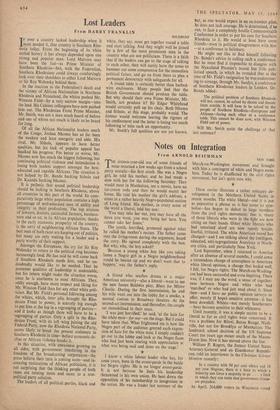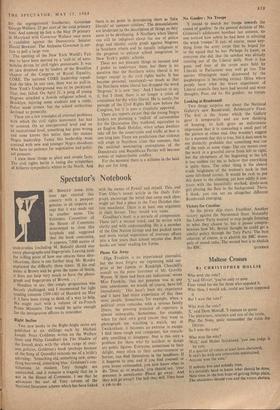Notes on Integration
From ARNOLD BEICHMAN
THE sixteen-year-old son of some friends of mine returned a few weeks ago from a school party ecstatic—his first crush. She was a Negro girl, he told his mother, and he had made a date with her for the following Saturday. They would meet in Manhattan, see a movie, have an ice-cream soda and then he would escort her home. He told his mother the girl's address, a street in a rather heavily Negro-populated section of Long lsland. His mother, in every sense of the word a liberal, told her son:
'You may take her out, you may have all the dates you want, you may bring her here. You cannot take her home.'
The youth, horrified, protested against what he called his mother's racism. The father came into the living-room during the argument, heard the story. He agreed completely with the ban. But why, why, the boy asked?
'Because a young white boy like you taking home a Negro girl in a Negro neighbourhood would be beaten up and we don't want that to happen,' was the father's reply.
A friend who teaches drama at a major American university—also a liberal—went to see the new James Baldwin play, Blues for Mister Charlie. During the first intermission, he and his wife went out into the lobby for a smoke, a normal custom in Broadway theatres. At the second-act intermission, and thereafter, the couple sat immobilised in their seats.
'I was just horrified,' he said, 'at the hate for the white man—for me—on the stage. But I could have taken that. What frightened me is how the Negro part of the audience greeted each- expres- sion of hate for the white man. I simply couldn't go out to the lobby and look at the Negro faces who had just been roaring with appreciation at what was being said and done on the stage.'
I know a white labour leader who has, for some years, been in the avant-garde in the battle for Negro rights. He is no longer avant-garde. It is not because he feels his leadership threatened in his own union. He beat dawn the opposition of his membership to integration in the union. He was a leader last summer of the March-on-Washington movement and brought with him a contingent of white and Negro mem- bers. Today he is disaffected by the civil rights movement, but isn't quite sure why.
These stories illustrate a rather unhappy de- velopment in the Northern United States in recent months. The white liberal—and it is not as pejorative a phrase as it has come to sym- bolise—has begun to defect in large numbers from the civil rights movement; that is, many of those liberals who were in the fight are now sitting on their hands. Other white liberals who had remained aloof are now openly hostile, fearful, irritated. The white American mood has changed—and I am talking about the intelligent, educated, anti-segregationist American in North- ern cities, and particularly New York.
Last September, when I returned to America after an absence of several months, 1 could sense a tremendous change of atmosphere in American white liberal opinion, a change that boded well,
felt, for Negro rights. The March-on-Washing- ton had been successful and even inspiring. There was, if I may use the word, a sense of together- ness between Negro and white who had 'marched' or who had just read about it. Since then—and I have no public opinion surveys to offer, merely (I hope) sensitive antenna—it has been downhill. Whites—not merely Southerners —have become sensitive to their whiteness.
Until recently, it was a simple matter to be a liberal as far as civil rights were concerned. It was a problem for Biloxi, Baton Rouge, Nash- ville, but not for Brooklyn or Manhattan. The landmark school decision of the US Supreme Court ten years ago meant south of the Mason- Dixon line. Now it has moved above the line.
William P. Rogers, the former United States Attorney-General and an Eisenhower Republi- can, told an interviewer in the Christian Science Monitor recently:
In a country with 90 per cent whites and 10 per cent Negroes, there is a limit to which .a minority can force a majority to go . . . a limit to which they can insist that government elimin- ate prejudice.
In April, 264,000 voters in Wisconsin voted for the segregationist Southerner, Governor George Wallace, 25 per cent of the total primary vote. And coming up fast is the May 19 primary in Maryland with Governor Wallace once more a candidate against the Democratic Senator Daniel Brewster. The Alabama Governor is cer- tain to poll a large vote.
The opening of the New York World's Fair was to have been marred by a 'stall-in' of auto- mobiles driven by civil rights protestants. It was an idea dreamed up by leaders of the Brooklyn chapter of the Congress of Racial Equality, CORE. The national CORE leadership repudi- ated the idea. In any case, there was no stall-in. New York's Underground was to be paralysed. That, too, failed. On April 21, a gang of young Negroes attacked a Jewish religious school in Brooklyn, injuring some students and a rabbi. Police made arrests, but the school authorities declined to prosecate.
These are a few examples of external problems With which the civil rights movement has had to contend. On an interpersonal level and on an institutional level, something has gone wrong and none knows this better than the mature Negro leadership. Today this leadership must contend with new and younger Negro dissidents Who have no patience for negotiation and politi- cal pressure.
I state these things as plain and simple facts. The civil rights battle is losing the sympathies of hitherto sympathetic whites in the North. And there is no point in denouncing them as `fake liberals' or 'summer soldiers.' The denunciations are irrelevant to the description of things as they seem to be developing. A Northern white liberal can still be indignant about the use of police dogs and electric cattle prods against Negroes in Southern streets and be equally indignant at the proposal to enforce school integration in New York's public schools.
These are not pleasant things to recount and I prefer to understate them, but there is no question that the Northern white liberal is no
longer engage in the civil rights battle. It has become personal, emotional—so much so that
the Northern white liberal has dropped the word 'Negroes.' It is now `they.' And I hesitate to say it, but I think there is no longer a crisis of conscience for the white liberal. He is, surely, for passage of the Civil Rights Bill now before the Congress, but it is now a ritualistic approval.
There are. reports extant that the young Negro leaders are planning a `stall-in' of automobiles for the Decoration Day weekend, equivalent to an English Bank Holiday, when urban dwellers take off for the countryside and traffic at best is one long jam. There are predictions that violence will erupt in Northern cities this summer, that the national nominating • conventions of the Democratic and Republican Parties will become arenas of indescribable conflict.
For the moment there is a stillness in the land. But not for long.































 Previous page
Previous page